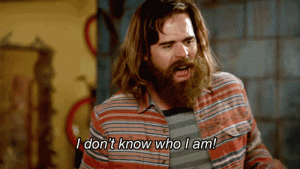Annotated 47-28
 It was John’s idea to have Rana doff his goggles for this page, and it’s so effective that I’m ready to forgive all those superhero movies that conveniently remove the hero’s mask for an emotional climax.
It was John’s idea to have Rana doff his goggles for this page, and it’s so effective that I’m ready to forgive all those superhero movies that conveniently remove the hero’s mask for an emotional climax.
This is Flo’s page, but it’s really Rana’s if you know what I mean. I’ve let the characters take over the story often enough that I can sometimes see when someone else is doing it.
We could’ve shown Rana’s flights in flashback, but it would’ve taken y’all far longer to understand that they weren’t really going anywhere. Having the words tumble out of Rana like this is more satisfying and puts everyone right inside his poor, ravaged psyche.
FB: “I’ve wandered around aimlessly for days even though I had a nominal destination in mind, I’m hallucinating, I’m sort of amnesiac, I’m sleep-deprived, I’m malnourished, I’m obsessed, and I’m completely unaware of any changes to our genocidal mission statement you might have made in my absence. So, is my spot on the front lines still open?” (“And hey, where’s Harky?”)











I get the feeling that more than killing he wants to die. But battle is the only honourable way he can think of dying, to go in a way that makes sense of the suffering he’s experienced.
Passive suicide
Nowdays, relationships seem downright disposable to many Gen Xers and Millenials. A lot of people I know might find this notion of not being able to exist without a loved one by your side baffling. I find comfort in knowing that’s not a unanimous point of view, though
That’s because the generational stepping stone that approach is jumping off is “a long-term relationship is something permanent, and no matter how your partner neglects or outright abuses that social contract, and yourself, you’re to stick to it”. But I feel that regresses the argument to the level of perennial ones such as “no one wants to work anymore”, so let’s instead contemplate – Rana’s ruffled feathers, and his fatalistic submission to the authority in face of despair.
That’s a little unfair towards Gen X. In the olden days finding a partner (and being reliable towards them) was a necessity of life because staying alone meant a much harder life. That ethos survived some time past its necessity, but it also included not being to picky about who you choose as your partner, and accepting that you’d have to tolerate a lot of what they’re up to.
These days, people do separate easier, and it makes for a lot less abuse and psychological warfare among partners, which is good, while also inviting *some* people to avoid committing anything to a relationship, which I guess is unavoidable. But none of this means that couples who’ve been together for a while, and still happy with each other were any less faithful towards each other. In fact, I would claim that makes it more probable that any couple which has stayed together for a few years and adapted to each other actually honestly starts sticking together like glue, independent of whether that’s expected by society or not.
…also: Finding the one person for life is still a life goal for most millennials. I’ve seen a lot more variety in the strategy to achieve this, though, and there seem to be loads of people who believe that *trying* enough people out would help them find the “right” person, or believing in the “happily everafter” narrative which says you can stop paying attention as soon as both partners are committed …. much of which have been picked up from older generations, who could rely on their partner to stay, almost no matter how badly they’d screw up. These days, you actually need to try and make things work in a way that everyone involved enjoys, and that’s harder, but it’s also way nicer when it does work (as I can attest myself :)
My impression: possibly fewer truly long-term relation (though more than you might think), but much happier ones. I think the longing for a partner who actually understands you and stays with you for life is way more than a cultural pattern and is not going to go away anytime soon.
Let’s also remember that relationships in the past had two components that are greatly diminished (for better or worse: in the present: First, it was much more affordable and possible for young people in love to cement their relationship with the purchase of a home together. That both made their lives easier (which often conflates in having more time to invest in a relationship) and increased the number of things they had in common. Second, there was much more religious and social pressure for married couples to stay together, again, for better or worse.
Young people nowadays cannot possibly dream of affording a home. That means that they grow older by themselves, developing their own personalities and interests on their own which makes them pickier (and as you mention, also unwilling to put the effort to commit to a person that is going to need lots of “work” after spending a few months with them).
I do feel that it’s not all good, though. Yes, we’re greatly diminishing the number of miserable marriages (which affected women disproportionally as they used to have less financial mobility so they had to “put up” with more for their survival) but I think it’s also making people give up on one another too easily or get too picky. Yes, we don’t have to tolerate assholery or waste our time with people who are not worth it. We don’t owe anything to anybody. But also… nobody is perfect. Learning to put up with minor differences, growing up together and becoming better for each other is possible… but some perseverance, effort, and love (the act of will, not the fickle emotion) are necessary.
Somebody reads bitter.